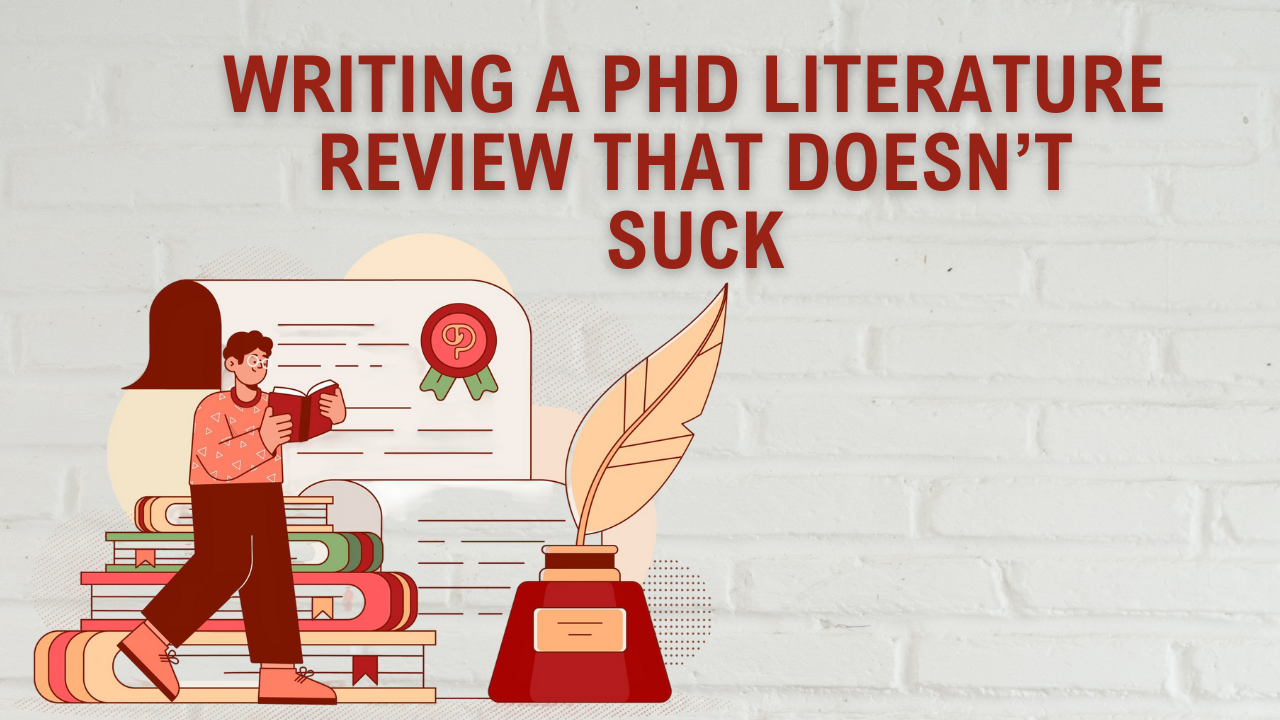07Jun

If you’re a PhD scholar, chances are you’ve already felt the overwhelming pressure of writing a solid PhD Literature Review. Between the endless reading, organizing references, and making sense of theories, it’s easy to get lost. But here’s the good news: writing a PhD Literature Review doesn’t have to suck. With the right strategy, mindset, and tools, you can create a compelling, coherent, and publication-ready literature review. In this comprehensive guide, we’ll walk you through practical steps, smart hacks, and common mistakes to avoid—so your literature review actually works for your PhD, not against it.

A PhD literature review is more than just a summary of existing research. It is an analytical, critical, and thematic synthesis of the research landscape related to your topic. Its purpose is to:
Put simply, it’s your chance to prove you know what you’re talking about and set the foundation for the rest of your thesis.
Let’s be honest—many literature reviews are boring, disorganized, or painfully shallow. Here’s why:
If you want your review to stand out, you need more than just summaries. You need strategy, synthesis, and storytelling.
Before you start reading, decide:
This will prevent you from wasting hours reading irrelevant studies.
Use academic databases like:
Use Boolean operators (AND, OR, NOT), filters, and citation trails to dig deeper.
Don’t rely on memory. Use tools like:
Pro tip: Create a literature matrix to compare studies across themes.
Instead of narrating research by year, structure your review thematically. Common themes include:
This helps show your critical thinking and positions your study within academic conversations.
Instead of saying:
“Author A said X, Author B said Y, Author C said Z…”
Say something like:
“While Author A and B agree that X leads to Y, Author C offers a counterpoint, suggesting that context Z alters the relationship.”
This shows that you can critically engage with literature rather than just report it.
A strong PhD literature review is not just a collection of facts—it’s a story that leads your reader to your research question. Ask yourself:
Your review should make readers say: “Ah, this is why this research is needed.”
Start messy. Don’t wait for perfect sentences. Once you’ve got your draft:
Kenfra Tip: Many PhD scholars seek help from research services like Kenfra, which offer expert guidance in reviewing, structuring, and polishing literature reviews for Scopus and SCI-standard publications.
Here are some hacks to make the process smoother:
These PhD writing hacks will save your sanity and increase your productivity.
At Kenfra, we understand the stress PhD students face during the literature review phase. That’s why we offer:
Whether you’re stuck at the start or nearly done, Kenfra’s PhD experts help transform your literature review from mediocre to publication-worthy.
A well-written PhD Literature Review is the backbone of your PhD thesis. It builds credibility, showcases your expertise, and frames your original contribution. Yes, it takes time. Yes, it’s challenging. But with the right approach, tools, and support—you can write a PhD Literature Review that doesn’t suck. Take it one theme, one reference, one paragraph at a time.
Kenfra Research understands the challenges faced by PhD scholars and offers tailored solutions to support your academic goals. From topic selection to advanced plagiarism checking.
Why You Need PhD Assistance for Your PhD Journey !! Introduction: Path to Academic Excellence / PhD AssistanceWelcome to the... read more

Write a Perfect Literature Survey Paper is an essential task for any researcher. It provides a foundation for understanding... read more

Many students and academic professionals are asking an important question in 2026: Is PhD mandatory for Assistant Professors? Let us... read more

Publishing research is a crucial part of academic life for every scholar. However, the rise of predatory publishing has created... read more

If you're launching a website, one of the most crucial decisions you'll make is choosing the right web hosting. Web... read more

Pursuing a PhD is one of the most significant decisions in an academic career. It’s not just about earning... read more
Kirigami is an art form similar to origami, but it involves both folding and cutting paper to create intricate designs.... read more

Publishing research is a crucial milestone in any PhD journey. The process of selecting the right journal for your... read more
WhatsApp us
Leave a Reply